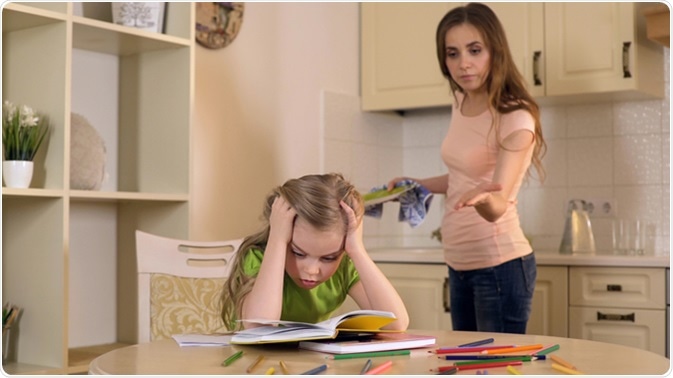.jpg) By Chloe Bennett, B.Sc.Reviewed by HH Patel, M.Pharm.
By Chloe Bennett, B.Sc.Reviewed by HH Patel, M.Pharm.There is an increasing demand for young people to do well and exceed expectations in all aspects of their life. Due to poor job security and high competition to secure college places, a lot of parents find themselves micromanaging their children to give them that added boost, but can this be detrimental to the child?

Image Credit: Motortion Films / Shutterstock
What is Helicopter Parenting?
Helicopter parenting is often referred to as the over part in over-parenting. It involves excessive levels of involvement and control by parents in their children’s lives. A motivation for this parenting style is driven by the parents’ worry that their child might come to harm or not flourish.
Early coverage of the parenting technique featured the impact of parents’ behavior on elementary and high school-aged children. However, the impact of high levels of involvement has been examined in college students and adults too.
A recent survey discovered that just several large companies had been contacted by their employees’ parents at one point during their employment.
Human resource professionals have reported incidents of parents attending job fairs on behalf of their children, and have even attempted to negotiate their child’s salary. Due to this increasing trend of over-active parenting, some colleges have now started providing guidelines for staff who have to interact with overly involved parents.
The 99% Is a Myth—Here's How It Really Breaks Down
Negative Effects of Helicopter Parenting
Parental involvement in a child’s life can be extremely beneficial, but only if it is developmentally appropriate. Despite, parents’ best efforts to help their children, helicopter parenting has been found to have harmful effects on the well-being of developing adolescents.
For children to develop, it is often necessary for them to fail and learn from their mistakes through trial and error. Unfortunately, helicopter parenting limits children’s ability to engage in this opportunity, and research suggests that it can stunt a child’s cognitive and emotional development.
Research examining the impact of helicopter parenting found that parents of children who had anxiety attempted to help their child more often than parents whose children did not have anxiety. This was seen even when the child did not ask for support. This suggests that the parents of anxious children may view challenges to their children as more threatening than the children perceive the same challenges themselves. If done frequently and over time, this can reduce their natural ability to succeed using their own initiative.
Similarly, studies have indicated that the parenting technique can actually cause anxiety. College students who reported that their parents were actively involved in their school work, or created very structured environments during their youth, were more likely to have depression and anxiety as an adult, and were less perseverant. These effects were explained by the perceived violation of the child’s right to freedom and competence.
Helicopter parenting can influence not only the psychological well-being of children, but also their social behavior.
Research investigating the effect of high parental involvement on psychosocial behavior concluded that high levels of parental involvement impacted the psychosocial adjustment of children, particularly during their teenage years. This is demonstrated by children acting out, and is linked to the externalization of problems.
Positive Implications of Helicopter Parenting
On the other hand, these warnings are contrasted by a body of literature which demonstrates that parental involvement can aid healthy development.
In family setups where parents are regularly involved in their children’s lives, and provide appropriate support for their development, the children tend to excel academically and emotionally, and build better relationships with their peers.
Specifically, high levels of maternal support are associated with socially acceptable behavior and hope in young people.
Additionally, when surveyed, children whose parents engaged in helicopter parenting thought positively towards them. In particular, they described them as being involved and emotionally supportive, despite the fact they felt that they were not given enough freedom.
Ultimately, parental involvement can be extremely beneficial for children. The literature surrounding helicopter parenting suggests that it is the type of parental involvement rather than the amount that will influence a child’s well-being and the ability to become a well-adapted adult.
Sources
- Schiffrin, H. H., Liss, M., Miles-McLean, H., Geary, K. A., Erchull, M. J., & Tashner, T. (2014). Helping or hovering? The effects of helicopter parenting on college students’ well-being. Journal of Child and Family Studies, 23(3), 548-557.
- Gibbs, N. (2009). The growing backlash against overparenting. Time Magazine. Retrieved from https://time.com/
- Grolnick, W. S., Kurowski, C. O., Dunlap, K. G., & Hevey, C. (2000). Parental resources and the transition to junior high. Journal of Research on Adolescence, 10, 465–488. doi:10.1207/SJRA1004_05
- Combs-Orme, T., Wilson, E., Cain, D. S., Page, T., & Kirby, L. D. (2003). Context-based parenting in infancy. Child and Adolescent Social Work Journal, 20, 437–472. doi:10.1023/B:CASW.0000003138.32550.a2
- Day, R. D., & Padilla-Walker, L. M. (2009). Mother and father connectedness and involvement during early adolescence. Journal of Family Psychology, 23, 900–904. doi:10.1037/a0016438.
- Padilla-Walker, L. M., & Nelson, L. J. (2012). Black hawk down? Establishing helicopter parenting as a distinct construct from other forms of parental control during emerging adulthood. Journal of Adolescence, 35, 1177–1190. doi:10.1016/j.adolescence.2012.03.007.
- Manos, M.A. (2009), “Helicopter parents: empathetic or pathetic?”, Phi Kappi Phi Forum, Vol. 89 No. 3, p. 21
- C. Bradley-Geist, J., & B. Olson-Buchanan, J. (2014). Helicopter parents: An examination of the correlates of over-parenting of college students. Education+ Training, 56(4), 314-328.
Further Reading
Last Updated: Jul 18, 2023